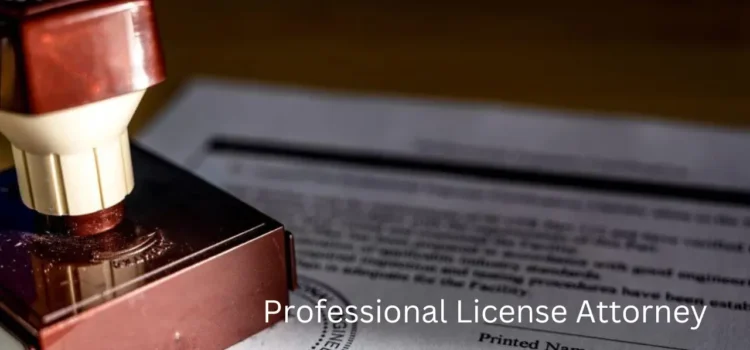According to new data, approximately 22.4% of workers hold licenses issued by the state or federal government. License denials or disciplinary actions are a tough spot, but it’s up to a professional license attorney’s attorney to appeal those denials and help with other license issues. Your hard-earned license could vanish if you’re not playing by the rules.
Although you have devoted your life to getting where you are today, it can be taken from you if you fail to comply. Mark Boesen, a healthcare license defense attorney, advises that if you were denied a license or if your license is threatened with an investigation, it is important to invest the same effort you devoted to your education and training or in developing your business into defending those assets from aggressive regulatory oversight.
Studies show that professionals who proactively seek legal advice and guidance are better equipped to maintain compliance with licensing regulations, reducing the risk of disciplinary action. In this article, we’ll cover what else they can do to provide licensed professionals with comprehensive support and advocacy in the face of legal obstacles.
Assisting With License Applications
A professional license attorney can guide you through the intricate process of completing and submitting your license application. They’ll make sure that all necessary documentation is gathered, accurately filled out, and submitted on time to the appropriate regulatory body. Working with a license attorney means having a guarantee that your application meets all the requirements, which increases your chances of approval.
A license attorney can also assist you in addressing any potential issues that may arise during the application process. Whether it’s clarifying certain information, responding to inquiries from the licensing board, or handling any legal obstacles that may surface, they’ll advocate on your behalf.
This proactive approach can help streamline the application process and mitigate any delays or complications that could arise. They can also help in application appeals, which means defending a license applicant when their license is denied or a “Statement of Issues” has been filed against them.
Defending Against Disciplinary Actions
Disciplinary actions are conducted to assess complaints or allegations against healthcare professionals without public disclosure. The licensing boards will conduct comprehensive reviews, considering evidence, witness statements, and the professional’s response before deciding whether disciplinary action is warranted.
During disciplinary proceedings, healthcare professionals have due process rights, the right to legal representation, the right to present evidence, and the right to challenge accusations—a complex legal process that a professional license attorney specializes in handling. They’ll be reviewing your case, gathering evidence, and developing a strong defense strategy tailored to your specific situation.
When facing disciplinary actions, time is of the essence. A license attorney will act swiftly to respond to any complaints or allegations made against you. They’ll represent you in front of the licensing board or administrative agency, presenting your case persuasively and advocating for the best possible outcome.
A license attorney can also negotiate on your behalf to reach settlements or agreements that may mitigate the disciplinary actions imposed. Leveraging their expertise and experience in professional licensing matters can help protect your license and reputation, allowing you to continue practicing in your chosen field. Don’t face disciplinary actions alone; seek the guidance of a professional license attorney to protect your career.
Representing Clients in Hearings
They’ll gather evidence, prepare legal arguments, and advocate on your behalf to protect your professional license. In hearings, your professional license attorney will be presenting your case to the licensing board or administrative agency. They will be upholding your rights during the hearing process, guiding you through each step, and representing your best interests.
Both the licensing board and the healthcare professional have the opportunity to present evidence supporting their respective cases. Witnesses may be called to testify, providing statements or evidence relevant to the alleged misconduct, as well as expert witnesses who may provide specialized knowledge or insights related to the case.
During the hearing, your attorney will cross-examine witnesses, present compelling evidence, and make persuasive arguments to support your case. They’ll challenge any evidence presented against you and work to discredit any allegations that may threaten your professional license. Your attorney’s expertise in professional license defense will be instrumental when dealing with the complexities of the hearing and fighting for a favorable outcome.
Handling License Renewals and Compliance or Reinstatement
A timely renewal and strict compliance with licensing regulations help maintain your professional standing and protect your career. A professional license attorney can assist you in handling any legal complexities you may face during your license renewals and making sure that all requirements are met.
They can help you keep track of renewal deadlines, gather necessary documentation, and submit paperwork accurately and promptly to the appropriate licensing authorities. As well as finding out why your renewal license application was rejected, we will give you strategies to overcome license rejection and represent a former licensee who’d like to re-enter their career field after having a license that has been suspended or revoked.
A license attorney also offers guidance on maintaining compliance with the regulations governing your profession. They can help you understand your obligations, stay updated on any changes to licensing laws, and address any compliance issues that may arise.
Appealing Licensing Board Decisions
An attorney specializing in professional licenses knows the ins and outs of licensing regulations and can help you create a compelling appeal to present before the board. They’ll review the details of your case, identify any legal errors or procedural missteps that may have occurred during the initial decision-making process, and develop a strategic plan to challenge the board’s ruling.
Their expertise in administrative law and experience with licensing boards can greatly boost your chances of a successful appeal. Enlisting the support of an experienced attorney can be your assurance to deal with the appeals process with confidence and work towards obtaining a positive resolution to your licensing dispute.
Conclusion
A professional license attorney plays a role in handling licensing regulations. They assist with defending against disciplinary actions, represent clients in hearings, handle license reinstatement and compliance, and appeal board decisions. It’s best to have their guidance to ensure that professionals maintain their licenses and continue to practice in their respective fields. If you ever find yourself in need of assistance with your professional license, don’t hesitate to reach out to an experienced license attorney for guidance.






